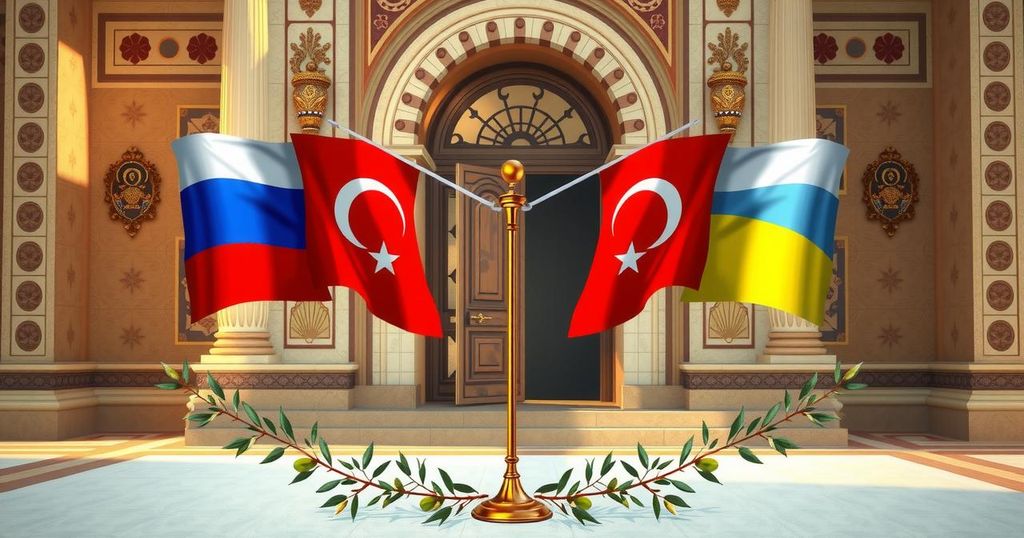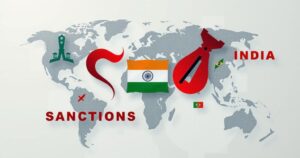Turkiye’s Diplomatic Balancing Act: Navigating Russia-Ukraine Talks in Istanbul

Turkiye continues to navigate its diplomatic role amid the Russia-Ukraine conflict, recently hosting delegations for talks but falling short of a direct meeting between the leaders. This illustrates Turkiye’s multifaceted approach to mediation while balancing interests with both nations. Analysts believe Turkiye’s involvement underscores its growing influence in global diplomacy.
The recent diplomatic engagement in Istanbul has spotlighted Turkiye’s ongoing balancing act between the conflicting interests of Russia and Ukraine since the onset of the war. Although expectations hovered around a possible meeting between Russian President Vladimir Putin and Ukrainian President Volodymyr Zelenskyy, it did not materialize as Putin opted out of the talks. Nonetheless, both nations dispatched delegations to Istanbul, resulting in an agreement on a prisoner swap and marking their first direct discussions since February 2022.
Previously, the Turkish city had been a venue for other significant dialogues in 2022, underscoring Turkiye’s pivotal role in addressing one of the hottest topics in international geopolitics. Adding to its diplomatic profile, Turkiye is also anticipated to enhance its influence in Syria, particularly following the lifting of U.S. sanctions on the Turkish-aligned government. Additionally, a domestic breakthrough saw the Kurdistan Workers’ Party (PKK) announcing its disbanding, concluding a conflict lasting four decades.
Analysts suggest that while the lack of a direct Putin-Zelenskyy meeting may seem a miss, Turkiye’s diplomatic involvement is a reaffirmation of its significance on the world stage. “Turkiye stands to win diplomatically whichever way the talks go,” stated Ziya Meral from the Royal United Services Institute (RUSI). He pointed out that Ankara’s ability to engage with both superpowers signals a triumph for the nation.
Over the past 15 years, Turkiye has continually positioned itself as a key diplomatic player, extending its reach into Africa and influencing the Syrian conflict. But its involvement in negotiations surrounding the Russia-Ukraine war represents an innovative approach. Omer Ozkizilcik from The Atlantic Council commented that this is a novel negotiation model where Turkiye actively mediates despite having vested interests in the conflicts.
“Turkiye started a peace process independent of the U.S. shortly after the invasion, leading to the Istanbul protocols of 2022,” Ozkizilcik noted. Previously, mediation roles were typically assumed by neutral parties, but Turkiye is breaking that mold, asserting itself as a regional power capable of negotiating due to its own geopolitical stakes.
The relationship between Turkiye and Russia has been marked by tensions, particularly regarding the conflict in Ukraine and positions in Libya and Syria. Early in the conflict, Turkiye classified Russia’s actions as a “war,” and along with other measures, it invoked the Montreux Convention, restricting Russian naval access to the Black Sea. Despite this, Turkiye’s provision of drones to Ukraine did not appear to sour its relations with Moscow, which continues to depend on Turkiye for economic and political cooperation.
Ozkizilcik explained that both nations have learned to navigate their differences carefully, pointing out historical moments of tension that were ultimately resolved through dialogue, such as the 2015 incident where a Turkish jet shot down a Russian fighter. This seemed to set a precedent for how the two nations handle their complex relationships.
On the flip side, Turkiye has cultivated a rapport with Western allies, particularly evident in its role during critical negotiations over Ukrainian grain exports in 2022. Kyiv’s relationship with Ankara remains vital, as evidenced by Zelenskyy’s gratitude towards Erdoğan for advocating on Ukraine’s behalf, especially regarding the fate of Crimea and the Turkic Crimean Tatars.
A senior fellow at the Center for European Policy Analysis, Steven Horrell, remarked that Zelenskyy recognizes the importance of Turkiye’s role. The mutual respect evident in their interactions positions Turkiye as an invaluable ally for Ukraine, allowing Ankara some flexibility in managing its ties with Russia with little pushback from Western nations.
Overall, Turkiye stands to bolster its prestige by facilitating these high-level discussions. “Turkiye views itself not just as a regional leader, but truly a leader on the global stage,” Horrell ultimately stated. As a result, Turkiye will continue to navigate this intricate web of international relations, leveraging its dual position to bolster its standing while simultaneously pushing for diplomatic resolutions.
In summary, the recent talks in Istanbul have once again demonstrated Turkiye’s unique capacity to act as a mediator between Russia and Ukraine amidst complex geopolitical dynamics. While the anticipated meeting between the leaders did not occur, Turkiye’s role is still significant, as it seeks to enhance its influence both regionally and globally. With a legacy of negotiation and a fresh approach that includes stakes in the conflicts, Turkiye appears poised to emerge stronger regardless of the talk’s outcomes. This balancing act is crucial, especially as Turkiye navigates its relationships with both the West and Russia, aiming to assert itself as a key player on the world stage.
Original Source: www.aljazeera.com





